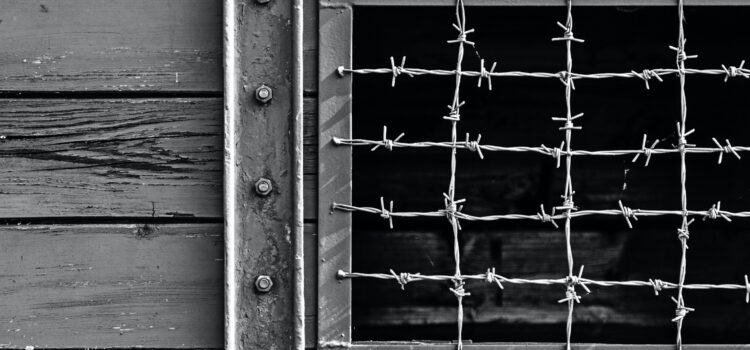

This article is an excerpt from the Shortform summary of "The Hiding Place" by Corrie ten Boom. Shortform has the world's best summaries of books you should be reading.
Like this article? Sign up for a free trial here .
What happened to Corrie ten Boom at Ravensbruck Camp? How did Corrie survive the atrocities?
Ravensbruck Camp was a facility set up by the Nazis to exterminate women. The concentration camp tortured people before executing them.
Despite coming to Ravensbruck Concentration Camp, Corrie ten Boom survived. See what happened when the ten Boom sisters came to Ravensbruck camp.
Ravensbruck Concentration Camp: Corrie ten Boom Arrives
No one on board knew exactly where they were headed, but, from looking out of the crude window they had gouged into the side of the train car, they knew what direction they were traveling—east, out of Holland and towards Germany, as Corrie had always feared. The journey wound on for two days as the women languished in the fetid and unsanitary conditions of the freight car. At last, after two days and two nights, the doors opened and the prisoners emerged. As she disembarked, Corrie knew immediately where they had arrived: Ravensbruck, the notorious women’s extermination camp.
Coming to Ravensbruck Camp
When she stepped off the train at Ravensbruck Concentration Camp, Corrie ten Boom saw a ghastly image: the tall smokestack rising like a spire from the camp. A strange smoke wafted up from it. She knew all too well that it was not coal or wood being burned there—it was the bodies of murdered Jews, political opponents, and other “undesirables” being cremated. She could scarcely bring herself to lay eyes on it.
Ravensbruck camp to was a world of squat, ugly concrete barracks, far worse than Vught or Scheveningen. The barbarism and brutality of Corrie and Betsie’s new home soon became apparent. When they arrived, the women began cutting each other’s hair to prevent lice infestation. The new prisoners now looked just like the old ones: bald, emaciated, sick, and terrified. For the first two nights, no provision was made for the incoming women from Vught. Corrie and her fellow transports slept under a crude tent that had been set up, with straw covering the ground. To her horror, Corrie saw that her straw was infested with lice.
After these first miserable nights out in the rain and cold, Betsie’s condition had grown even worse. She had a lingering cough and was soon suffering from intestinal cramps. Her only option to relieve herself was in a ditch that had been dug to serve as a latrine for the newcomers. On the third night, the new arrivals were at last processed into the main camp.
The ordeal was unimaginably degrading. Corrie and the other women were forced to strip naked and shower in front of the SS men, in cockroach-infested showers. Deprived of proper sanitary facilities, they were ordered to relieve themselves using the drain holes in the shower as toilets. There was no privacy, no dignity. Corrie managed to hold on to her Bible by concealing it in her blue sweater. Miraculously, the guards overlooked it when they searched the women as they emerged from the showers. It was her spiritual nourishment in this place that seemed so far removed from God. But she knew that God was with her, even in Ravensbruck Camp.
Conditions were worse in the rodent and louse-infested barracks, temporary housing for the new arrivals. Corrie and Betsie had to share a bed with three other women, who were already asleep in the bed when they arrived. The cabin was overcrowded, with women scrambling over one another to find a place in their beds, kicking and jostling one another. If someone needed to relieve themselves in the middle of the night (using one of the filthy and overflowing toilets) they needed to climb over their bedmates.
Roll call at Ravensbruck Camp was at 4:30 am. Corrie and Betsie’s barracks were located next to the punishment barracks—the place prisoners were sent if they violated the camp rules. Screams of torture from beating and whipping could be heard from inside. For Corrie, they were the very sounds of hell.
Barracks 28
When the women were returned to their barracks after roll call, they had one source of hope and comfort—Corrie’s Bible. The message of the conquering power of God’s love came through to all the women in the barracks, even in a place like Ravensbruck. The Bible told them that nothing, not torture, or even death, could separate them from Christ’s love. Ultimately, through that love, they would triumph.
Corrie remembered that Christ, too, had been beaten and tortured, just as the prisoners at Ravensbruck Camp had been. She saw in His agony on the cross—and ultimate redemption—a parallel for her own experiences. Like Him, she had been beaten, whipped, and stripped naked. And like Him, she would rise up and conquer.

———End of Preview———
Like what you just read? Read the rest of the world's best summary of Corrie ten Boom's "The Hiding Place" at Shortform .
Here's what you'll find in our full The Hiding Place summary :
- Why devout Christian Corrie ten Boom decided to stand up to the Nazi occupation
- How ten Boom and the Jewish neighbors she was hiding were caught
- How ten Boom survived the concentration camp and left with even stronger faith






